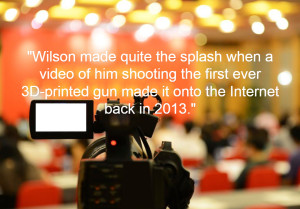Cody Wilson, the creator of the 3D-gun has filed a lawsuit against the federal government’s State Department. Two years ago, government officials demanded that Wilson remove the instructions that he had posted online to teach readers how to build 3D-printed guns. Wilson argues that his Internet instructions are merely code and represent his freedom of expression as well as his right to bear and manufacture arms. Wilson has targeted the State Department  in his lawsuit as it allegedly threatened him to remove the code. He alleges that the State Department’s orders violated his right to freely express himself.
in his lawsuit as it allegedly threatened him to remove the code. He alleges that the State Department’s orders violated his right to freely express himself.
The instructions that Wilson posted on the world wide web teach readers how to build a small single shot plastic handgun called “the Liberator.” Wilson made quite the splash when a video of him shooting the first ever 3D-printed gun made it onto the Internet back in 2013.
The State Department quickly contacted Wilson when he publicized the directions to create replicas of the 3D gun. They threatened him with enormous fines as well as criminal charges. The department alleged that Wilson might have been in violation of export rules regarding military technology and weapons.
Wilson is now on the legal attack with the help of first and second amendment attorneys who want to protect free speech. His federal court lawsuit argues that the directions he posted on the web are simple code and constitute his right to free speech. The suit alleges that the censorship of code is analogous to the violation of Wilson’s right to bear and manufacture arms. Wilson argues that his Internet postings should be protected by the Constitution’s first amendment and that this case is about much more than merely the right to bear arms.
When the State Department demanded that Wilson remove his uploaded files, they cited a group of federal rules known as the International Traffic in Arms Regulation (ITAR) that aims to control the importing and exporting of technology and weapons. It is also designed to protect military secrets. They argued that posting gun-making code to  the web might equate to illegally providing blueprints across the globe without the proper license. Yet the department never actually determined if Wilson needed a license to post his code. Wilson’s code was downloaded over 100,000 times in only two days and has since spread to Torrent websites.
the web might equate to illegally providing blueprints across the globe without the proper license. Yet the department never actually determined if Wilson needed a license to post his code. Wilson’s code was downloaded over 100,000 times in only two days and has since spread to Torrent websites.
The progress of Wilson’s lawsuit will be closely monitored by attorneys, legal watchdogs, the media and a number of other interested parties who are concerned with free speech rights. At the crux of the suit is whether the federal government should have any authority over the sharing of information in an online context. It will also provide some clarity as to whether the courts will still treat code as speech similar to musical notation or mathematics. If Wilson wins, he will be able to post his 3D-gun making code to the web and also receive compensation in the form of punitive and exemplary damages.


